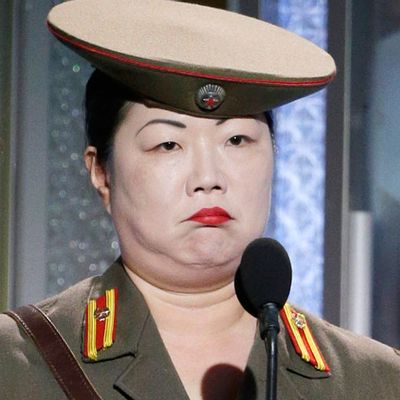
First of all, let’s just call Margaret Cho’s long, dwindling joke at the Golden Globes last night what it was: yellowface. In stiff military garb, Cho came out in character as General Cho Young-Ja, a North Korean Army general and contributor to Movies Wow! magazine. For the ongoing bit, hosts Tina Fey and Amy Poehler trotted Cho out throughout the ceremony, first to take a picture with Meryl Streep, unspeaking and unsmiling, then to expound on Dennis Rodman and Orange Is the New Black. It was an empty caricature filled with bluster: a making good on a demand to roast a Hollywood bully that was as fictional as its movies. Hollywood needed a punching bag after the Sony hack and ensuing debacle with The Interview, and Cho willingly suited up.
Cho defended herself today on Twitter saying that she has the right to do this because she is of North Korean and South Korean descent. “I’m of North and South Korean descent, and I do impressions of my family and my work all the time [sic], and this is just another example of that,” Cho said to BuzzFeed in a postmortem on Monday. “I am from this culture. I am from this tribe. And so I’m able to comment on it.”
I should note that the question of yellowface is not the same as, “Was it racist?” When a white actor dons yellowface, as Mickey Rooney did in the Audrey Hepburn classic Breakfast at Tiffany’s as Mr. Yunioshi, the act is indeed aggressively racist — a caricature designed to reduce a person, and by extension a people, to a stereotype. The act becomes more complex when a person of color puts on a mocking stereotype, as Cho does here, because there’s a connection between the actor and the image. In some ways, it can be a useful tool for subversion; at other times, it’s just unfunny business.
Margaret Cho’s comedy has always relied on utilizing a brand of Orientalism. For instance, in her HBO comedy special from 1994, she does a sketch where she plays a “sponsored child” for Star magazine. She dons a rice paddy hat and “Asian” accent as she shares her weight-loss secret: contracting malaria. On the face of it, this could be just another instance of yellowface, but Cho introduces the sketch with a story of when her brother sent her a clipping from Star magazine that featured her on the cover with the headline “Chow Like Cho Diet” and a fake interview. “When I was young, I was raised on rice and fish, so when I get heavy I go back to that natural Asian way of eating,” Cho relays. “That’s so racist you can almost hear the choppers overhead.”
In that sketch and others, Cho used yellowface as a way to subvert expectations. She knew how white people saw her, and threw it back into their faces. It’s not dissimilar to this biting and brilliant Key & Peele sketch where they interrupt a Confederate Army reenactment and call the white men “Massa.” In both of these instances, the minstrelsy says more about white people than it does about the person doing it.
Minstrelsy is only effective when it has a political aim to upend expectations — to make the gaze itself the subject of scrutiny. In this case, dressing up as an inscrutable North Korean general, Cho only furthered the idea that North Koreans are ultimately unknowable, ignorant, and bad speakers of Engrish. The joke made no demand of its immediate audience, who was overwhelmingly white, and instead played very safely to the crowd’s racialized expectations. Maybe the most important — and vexing — question about minstrelsy is the most basic one about comedy: Why are people laughing?




